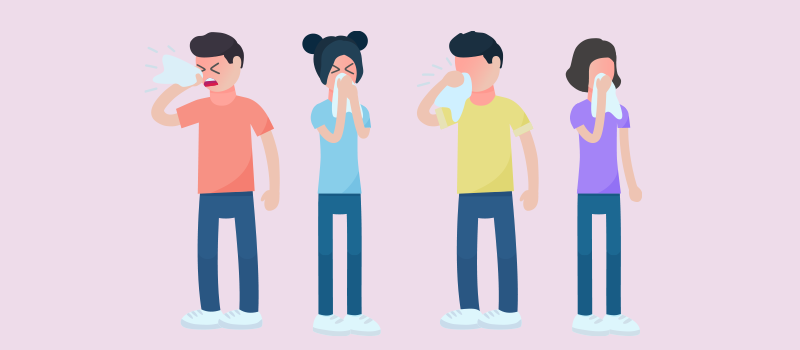What’s the Buzz
The Bee Healthy Blog
Best Medicine to Dry Up A Runny Nose

- There are several good options for getting rid of a runny nose, including antihistamines, oral decongestants, saline nasal sprays, and nasal decongestant sprays.
- Expectorants and cough suppressants can also be used to clear up flu-like symptoms such as cough and stuffy nose.
-
Family physicians may choose to give you prescription medications or antibiotics for infectious diseases caused by bacteria, such as Strep throat.
A runny nose (medical term: rhinorrhea) is the secretion of mucus or a thin, watery discharge out of the nose that can also drip down into the throat. It is most often caused by the common cold virus, flu virus, chilly temperatures, or allergies.
Runny noses are signs that your immune system is working. However, the symptoms can be uncomfortable. In most cases, over-the-counter medicines can relieve cold and flu symptoms like a runny nose. However, with such a wide variety of OTC cold medicines available, choosing the right one can feel overwhelming.
Please continue reading to learn more about the best medicines to relieve nasal congestion, runny nose, and other flu and cold symptoms.
How do you get rid of a runny nose fast?
To treat a runny nose or stuffy nose, you should drink plenty of fluids, especially water, and get plenty of rest. You can also get relief by using a saline nasal spray, decongestant nasal sprays, neti pot, or cool-mist humidifier.
It’s generally good to avoid spicy foods as they can worsen symptoms like a runny nose and watery eyes.
In terms of medications, the best cold medicines are over-the-counter antihistamines that help relieve cold and flu symptoms such as runny nose, sneezing, and watery eyes.
Which antihistamine is best for a runny nose?
There are several good options among antihistamines to dry up a runny nose, including diphenhydramine (Benadryl, Nytol), brompheniramine (Dimetapp Cold, Robitussin Cold & Allergy, Allergy Elixir), and doxylamine (Alka-Seltzer Plus Night-Time Cold Medicine, NyQuil).
Second-generation antihistamines are typically non-sedating or non-drowsy, which are suitable for daytime use. Other antihistamines can cause drowsiness and help you sleep through the night. Check out our blog on the best non-drowsy antihistamines.
What cold medicine dries up a runny nose?
Oral decongestants relieve nasal congestion and make breathing easier by reducing the swelling of the blood vessels in the nose.
Examples include pseudoephedrine (Sudafed, Contac Cold 12 Hour), available without a prescription. However, this medicine is sold from behind the pharmacy counter in limited quantities because it can be misused to make methamphetamine (meth) illegally.
Preservative-free saline nasal sprays such as Flo Saline Plus and Ayr contain salts dissolved in purified water. They work by dissolving thick mucus and moisturizing inflamed nasal passages.
Nasal decongestant sprays like Sinex and Afrin can be used for 1-3 days to reduce stuffiness in the nose. They contain oxymetazoline and work by decreasing blood flow and swelling in the nasal tissues. Using them for a long time can result in rebound congestion, making your symptoms worse. Always consult a doctor or pharmacist before using home remedies for longer than recommended or if your symptoms get worse.
Save On Your Cold Medicine With BuzzRx!
What’s the best cough medicine?
Antihistamines block the chemical histamine that triggers symptoms such as runny nose, watery eyes, and postnasal drip (mucus and other secretions trickling down the throat).
Postnasal drip can irritate the throat and cause coughing. Therefore, drying up these secretions with an antihistamine can help to relieve cough.
Examples of antihistamines used for this purpose include Actifed Cold and Benadryl Allergy & Cold.
Expectorants like guaifenesin (Guai-Aid, Mucinex) thin out the mucus and make it easier to cough up and expel.
Cough suppressants or antitussives relieve cough by blocking the cough reflex in the brain. Common cough suppressants like dextromethorphan are present in cough and cold medicines like CVS Health Tussin Cough Liquid Gels and Robitussin Cough Gels. Combination products like Delsym Adult DM Cough + Chest Congestion Relief Liquid and Vicks Dayquil Cough also contain a cough suppressant.
What medicine is best for flu-like symptoms?
Lozenges and numbing throat sprays contain active ingredients such as benzocaine (Cepacol, Vicks Vapodrops), and phenol (Chloraseptic). They provide pain relief from a sore throat by acting like local anesthetics (numbing agents).
Acetaminophen (brand name Tylenol) is a commonly used fever reducer and pain reliever. This medicine is safe for use by most people. It is present in combination products like Vicks Dayquil Cold & Flu Relief and Tylenol Cold + Flu Severe.
An overdose of acetaminophen can be harmful to the liver, so it’s important to take no more than the recommended daily maximum dose (3,000 mg every 24 hours in adults).
Nonsteroidal anti-inflammatory drugs (NSAIDs), such as aspirin, ibuprofen (Advil, Motrin), and naproxen (Aleve), can be used to reduce fever, inflammation, and other symptoms such as headache, sinus pain, body aches, and muscle pain.
Other cold and flu medicines like Excedrin contain acetaminophen, aspirin (an NSAID), and caffeine, which work together effectively to relieve pain.
| Cause | Treatment |
| Bacterial infections | OTC Decongestants (e.g., Sudafed), Saline Nasal Sprays |
| Sinus infections | Antibiotics (if prescribed) |
| Seasonal/Perennial Allergies | Decongestants, Saline Nasal Sprays, Sometimes Antibiotics |
| Environmental factors | Antihistamines (e.g., Claritin, Zyrtec), Nasal Corticosteroids (e.g., Flonase) |
| Non-Allergic Rhinitis | Humidifiers, Saline Nasal Sprays |
| Physical Causes | Corticosteroids, Surgery (if severe) |
| Other Health Conditions | Treatment Specific to the Condition (e.g., Antibiotics for Bacterial RSV, Acid Reducers for GERD) |
| Exercise | Antihistamines, Nasal Ipratropium |
| Head Injury | Immediate Medical Attention, Possibly Surgery |
| Age-related Changes | Consult with a Healthcare Provider |
Don't forget to schedule your annual flu vaccination!

Schedule a vaccination
You have options when it comes to getting vaccinated. CVS Pharmacy is one option available to you. Verify network coverage with your health insurance plan.
What is nasal congestion?
Nasal congestion refers to the swelling of nasal passages, which prevents smooth airflow, making it harder to breathe through the nose. It occurs due to inflamed blood vessels in the nasal membranes (medical term: rhinitis).
Nasal congestion can make it harder to expel mucus out of the nose. This can result in clogging of the nasal passages with thick mucus, making you feel stuffed up. For this reason, it’s also called a stuffy nose.
Over-the-counter nasal decongestants can help to relieve these common symptoms. Check out our blog to compare decongestants vs antihistamines.
The best treatment for cold and flu or allergies depends on your symptoms. Most often, rest and drinking lots of water are essential. In addition, taking the right medication will help you recover more comfortably. Check out our blog to find out: What’s the best antihistamine for cat allergies?
For example, the best cold medicine for a runny nose should contain an antihistamine that can dry up secretions.
If you do not get symptom relief within a few days of using over-the-counter medicines, be sure to obtain advice, diagnosis, or treatment from a healthcare provider.
Family physicians may choose to give you prescription medications or antibiotics for infectious diseases caused by bacteria, such as Strep throat.
It is especially important for certain people, such as young children or pregnant women, to be medically reviewed by healthcare professionals before using over-the-counter cold and flu products.

SOCIAL